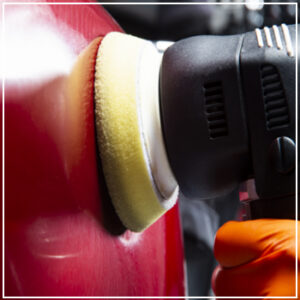 The goal for any car paint job should be a smooth, even finish. Unfortunately, there’s potential for an “orange peel” texture to result, which mars the appearance and requires a professional to correct.
The goal for any car paint job should be a smooth, even finish. Unfortunately, there’s potential for an “orange peel” texture to result, which mars the appearance and requires a professional to correct.
What Is Orange Peel Paint?
An orange peel texture is one of several potential imperfections that can occur after you apply new paint to your car. Orange peel texture refers to a dimpled, bumpy appearance that’s similar to the surface of a citrus fruit. It becomes particularly prominent when light shines on your vehicle, with the reflection becoming wavier and more rough.
Although orange peel often occurs when you attempt a DIY paint job, it can result from poor professional conditions or may be present when you receive a car directly from the manufacturer.
How Orange Peel Paint Happens
To understand how orange peel effect occurs, it’s important to know the process of painting a car. Today, that’s primarily based on atomization. Through an instrument spraying paint, the substance particles are broken up even further into small droplets. This results in a more even, smoother finish.
Orange peel occurs when the paint is not divided into fine enough particles. This results in chunky paint that ends up on the car’s surface, creating a rough and uneven texture.
While this factor is typically behind most cases of orange peel paint, other scenarios may influence its appearance:
- The paint was applied at too hot of a temperature
- The paint was not mixed thoroughly or correctly
- Paint thinner started to evaporate from the solution
- Too much paint was applied at once
- The spray gun was not on the correct setting, resulting in less air
- The spray gun was not angled perpendicularly to the vehicle or was too close to the surface
Correcting Orange Peel Paint
Orange peel paint corrections should be done by a professional. Avoiding the orange peel effect in the first place comes down to the right ratios and conditions: Painting in a shaded area with a sufficient amount of air and paint thinner that won’t cause clumps or a runny consistency.
If you purchased a car with orange peel paint or a DIY project led to these results, improvement starts with applying a compounding polish to lessen the bumpy texture. From here, if the texture is still visible in the sunlight, a professional will use a fine-grain sandpaper to wet-sand the surface until the bumps are gone. After, the remaining paint is polished for a smooth, professional finish or the surface may be repainted entirely, including base and clear coats.
At DaSilva’s Auto Body, we use spray booths to create an even appearance and eliminate outside elements that could affect paint texture. To learn more about our auto painting services, contact us today.




